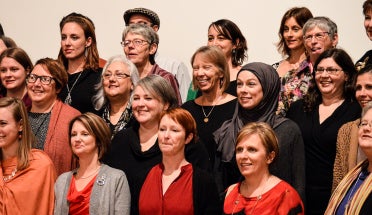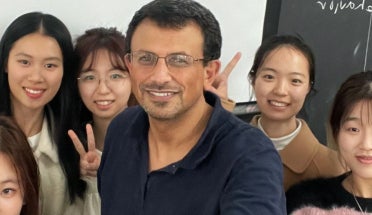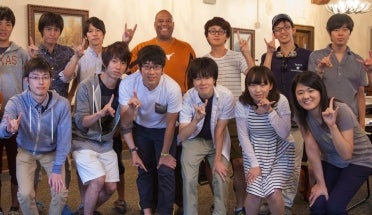
Colombian iSchool Scholar Embraces Culture, Career on Forty Acres
- Apr 12, 2023
- English Language Center
- by Kayla Johnson
The University of Texas at Austin welcomes students and scholars from more than 130 countries around the world, combining and magnifying their curiosity and ingenuity into groundbreaking collaborations and knowledge. Along the way, international and American students mingle in a variety of environments — classrooms, campus jobs, clubs and other activities — and learn from each other’s experiences and cultures.
This is exactly what Colombian graduate student Maria found out when they came to the Forty Acres to pursue a master’s degree in information science. (Maria, who uses they/them pronouns, has asked that their last name be omitted from this story.)
Expanding Cultural Proficiency
Maria says graduate school has been a journey of self-discovery. One of the biggest challenges has been trying to translate their personality into a new language. Having always been the “funny friend” back home, they found it frustrating when their jokes didn’t land the same in English.
At first, Maria felt pressured to reinvent themself to be accepted. But the more they socialized with new people, the more confident they felt in building connections. The key, they said, is “losing yourself and not being afraid to make mistakes.” They added that while things sometimes come out wrong, when you put yourself out there, everything usually works out.
Living in Austin provided Maria the opportunity to learn about what makes American university life unique. Since there’s not a heavy emphasis on “college culture” in Colombia, they said, Maria still finds things like sororities and fraternities “otherworldly.”
“Here, it’s a whole thing about moving away from your parents and living on your own for the first time,” Maria said. “For some people, that implies partying, dating and all those things.”
Another way Maria has made new connections on campus and immersed themself in American culture is by working various student jobs. During their first semester at UT Austin, they worked at Kinsolving Dining Hall, where they routinely spoke with other American students and learned new vocabulary in context.
“There are a lot of words and terms that you don’t really get to know unless you work in a very specific environment, like kitchen items,” Maria said.
Language Learning Yields Competency
For a more formal type of learning, Maria also took advantage of several resources that UT Austin offers to help international students and scholars navigate what can sometimes be a difficult journey through the American higher education system.
After completing their undergraduate studies in computer science and software engineering in Colombia, Maria was eager to further hone their professional skills. They knew they wanted to attend graduate school, but the application process felt daunting.
“I still was not familiar with how to apply to graduate programs, and I felt like I was not ready yet,” Maria said. But their uncertainty was eased when they learned about the Academic English Program run by UT Austin’s English Language Center (ELC).
The ELC offers a variety of English language programs and social events to help international students and scholars reach their desired proficiency levels and find community across campus.
The Academic English Program is a full-time, intensive track designed to help students increase their academic vocabulary. In addition to reading, writing, speaking and grammar courses, students learn essential skills for success in graduate school, such as writing scholarly papers and giving technical presentations. Maria thought the program would be the perfect launchpad toward their career goals.
Beyond improving their English abilities, Maria said they received helpful tips for standing out as a graduate school candidate. One instructor gave the game-changing advice to reach out via email to establish relationships with professors at their prospective schools.
“It might sound obvious for a lot of people. But as an international student, I had no idea I needed to do that,” Maria said. “I thought I just needed to apply.”
Maria enjoyed their ELC classes so much, they decided in Spring 2022 to also complete the advanced level of the English Language Program, which is less formal and more focused on preparing students for work and daily life in the United States.
Academic Investigations Spark Ambitions
Now enrolled in UT Austin’s School of Information, Maria is working on a master’s degree in information studies, with a special interest in data science.
Maria worked as a teaching assistant before moving into their current role as a research assistant at the IC² Institute. The institute investigates how the economies of small communities are impacted by business, governmental and educational policies. As part of their latest project, Maria is assessing the training programs of local Austin startups.
Since their graduate studies are more theoretical than what they learned as an undergrad, Maria says they’ve gotten to explore different fields, which has sparked new ambitions.
“During my academic and professional experience, I realized that coding and dealing with data is something I really enjoy and am passionate about,” Maria said. In the future, they plan to work as a data scientist or in information security, though they’re still unsure which country they’ll settle in.
Maria emphasized that UT Austin has outstanding professors willing to help students like themself find their career paths. For other international students at universities around the world, they advised students everywhere to “take advantage of all the opportunities that [your] university ... has for you.”



